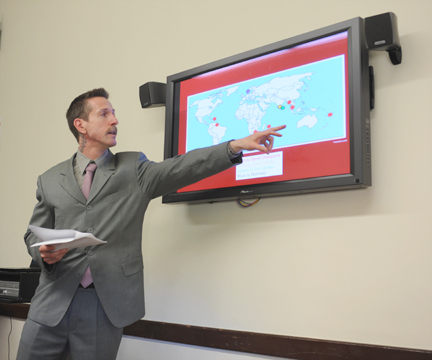City College students present honor projects at Stanford
By Crystal Bungori
Contributing writer
A select group of City College honors students were invited to present on various scholarly ideas at the Honors Research Symposium at Stanford University on May 7.
Only seven out of 20 students from City College were selected. The students – Nadia Hosking, Shomriel Goodman, Jesse Clayburgh, Thatcher Combs, Rebecca Allard, Paul King and Branduin Stroud – have been practicing their scholarly presentations for an entire semester in groups and with their mentors.
The symposium contained three sessions, with City College students presenting in the first and second sessions.
Shomriel Goodman presented her topic, “Women’s Work Wordsmiths and Warriors in Southern Appalachia” in the second session.
“The strong women in the area are connected to the land and use poetry to reflect,” she said.
Goodman chose this topic because her favorite author, Wendell Berry, is a cultural and economic critic who is against coal mining in the Appalachias.
“I first started researching poetry in the area then became aware of the issue,” she said.
Also in the second session, transgender student Thatcher Combs, who is majoring in LGBT studies, presented “What Defines Beauty?” During his presentation, he displayed lesbian, gay, bisexual, and transgender artwork while discussing society’s view on the LGBT community as a whole.
“As a society, stop thinking just because we wrote it in paper things have changed,” Combs said.
One of the key points Combs made was that the LGBT community is not something that is brand new, but goes back historically.
Rebecca Allard’s topic was “The Savage Self-Appropriation of the Primitive in Paul Gauguin.” In her presentation Allard discussed the idea of “primitivism” through Gauguin’s use of tribal elements in his artwork.
“The art of non-western tribal people was thought to be creative, sensual and simple,” Allard said.
Anthropology major Paul King presented the topic “Superstition of Belief.” His presentation explored ancient and modern flesh-hook suspension, which both yields psychological and sociological benefits, according to ancient and modern cultures.
In his presentation, King showed graphic photographs of people hanging by hooks piercing their skin in different areas of their body.
King is a professional piercer and said, “I chose to participate.”
Some in the audience wanted to know if there was bleeding in this ritual. “In traditional and modern practices it constricts blood vessels, so there’s almost no bleeding,” he said.
Email:
email@theguardsman.com


Comments are closed.